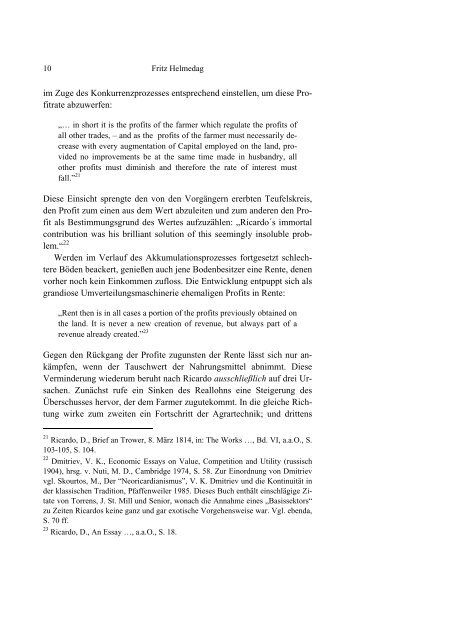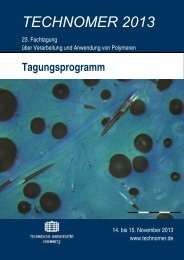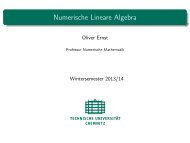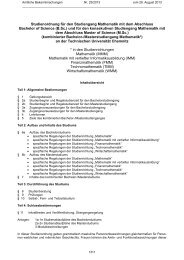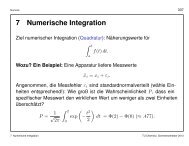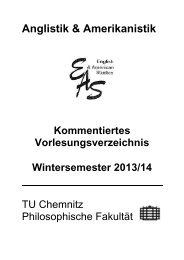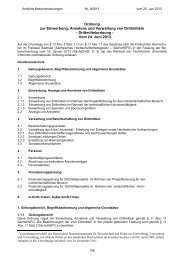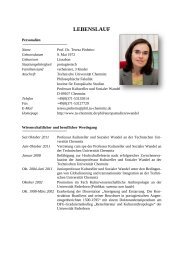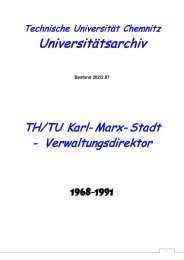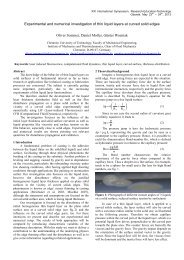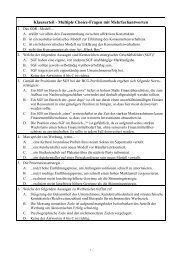2.3 David Ricardo: Profitrate und Kapitalakkumulation Die Klassik ...
2.3 David Ricardo: Profitrate und Kapitalakkumulation Die Klassik ...
2.3 David Ricardo: Profitrate und Kapitalakkumulation Die Klassik ...
Erfolgreiche ePaper selbst erstellen
Machen Sie aus Ihren PDF Publikationen ein blätterbares Flipbook mit unserer einzigartigen Google optimierten e-Paper Software.
10 Fritz Helmedag<br />
im Zuge des Konkurrenzprozesses entsprechend einstellen, um diese <strong>Profitrate</strong><br />
abzuwerfen:<br />
„… in short it is the profits of the farmer which regulate the profits of<br />
all other trades, – and as the profits of the farmer must necessarily decrease<br />
with every augmentation of Capital employed on the land, provided<br />
no improvements be at the same time made in husbandry, all<br />
other profits must diminish and therefore the rate of interest must<br />
fall.” 21<br />
<strong>Die</strong>se Einsicht sprengte den von den Vorgängern ererbten Teufelskreis,<br />
den Profit zum einen aus dem Wert abzuleiten <strong>und</strong> zum anderen den Profit<br />
als Bestimmungsgr<strong>und</strong> des Wertes aufzuzählen: „<strong>Ricardo</strong>´s immortal<br />
contribution was his brilliant solution of this seemingly insoluble problem.“<br />
22<br />
Werden im Verlauf des Akkumulationsprozesses fortgesetzt schlechtere<br />
Böden beackert, genießen auch jene Bodenbesitzer eine Rente, denen<br />
vorher noch kein Einkommen zufloss. <strong>Die</strong> Entwicklung entpuppt sich als<br />
grandiose Umverteilungsmaschinerie ehemaligen Profits in Rente:<br />
„Rent then is in all cases a portion of the profits previously obtained on<br />
the land. It is never a new creation of revenue, but always part of a<br />
revenue already created.” 23<br />
Gegen den Rückgang der Profite zugunsten der Rente lässt sich nur ankämpfen,<br />
wenn der Tauschwert der Nahrungsmittel abnimmt. <strong>Die</strong>se<br />
Verminderung wiederum beruht nach <strong>Ricardo</strong> ausschließlich auf drei Ursachen.<br />
Zunächst rufe ein Sinken des Reallohns eine Steigerung des<br />
Überschusses hervor, der dem Farmer zugutekommt. In die gleiche Richtung<br />
wirke zum zweiten ein Fortschritt der Agrartechnik; <strong>und</strong> drittens<br />
21 <strong>Ricardo</strong>, D., Brief an Trower, 8. März 1814, in: The Works …, Bd. VI, a.a.O., S.<br />
103-105, S. 104.<br />
22 Dmitriev, V. K., Economic Essays on Value, Competition and Utility (russisch<br />
1904), hrsg. v. Nuti, M. D., Cambridge 1974, S. 58. Zur Einordnung von Dmitriev<br />
vgl. Skourtos, M., Der “Neoricardianismus”, V. K. Dmitriev <strong>und</strong> die Kontinuität in<br />
der klassischen Tradition, Pfaffenweiler 1985. <strong>Die</strong>ses Buch enthält einschlägige Zitate<br />
von Torrens, J. St. Mill <strong>und</strong> Senior, wonach die Annahme eines „Basissektors“<br />
zu Zeiten <strong>Ricardo</strong>s keine ganz <strong>und</strong> gar exotische Vorgehensweise war. Vgl. ebenda,<br />
S. 70 ff.<br />
23 <strong>Ricardo</strong>, D., An Essay …, a.a.O., S. 18.


